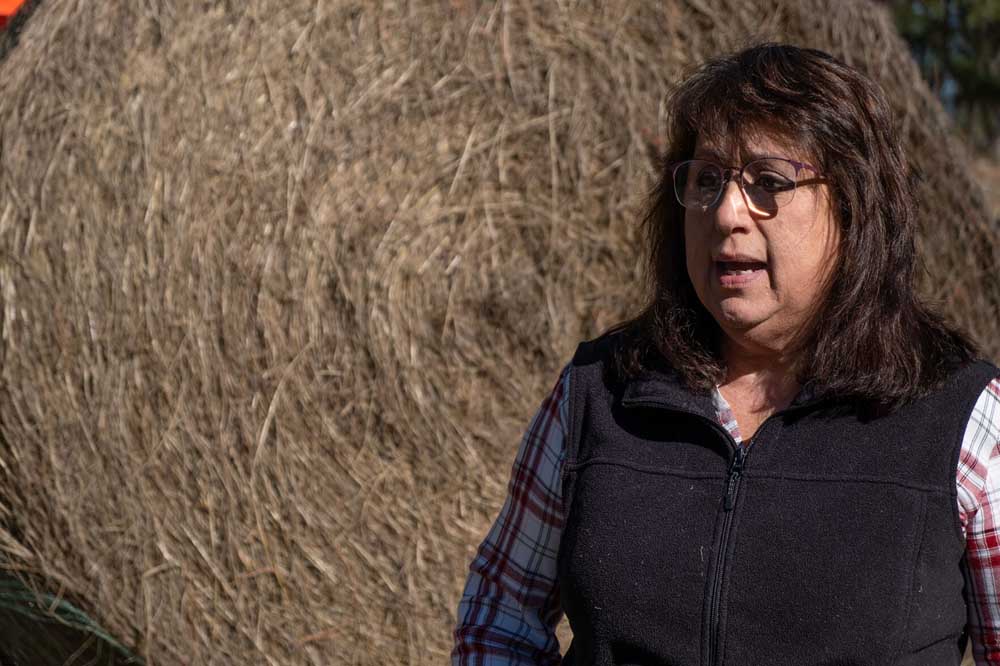Biden administration looks to boost smaller farmers, meat packers
Published 5:45 am Tuesday, January 11, 2022

- Karen Brunson spends her afternoon feeding to her beefalo cattle, on Monday January 10, 2022, at Brunson Farms in Gilmer. (Michael Cavazos/ News-Journal Photo)
When it comes to purchasing meat for the dinner table, Brunson Farms owner Karen Brunson said buying local is important.
Brunson and her husband, Tim, operate their grassfed Beefalo cattle operation on 220 acres of family land outside of Gilmer. Beefalo genetically is 3/8 American Bison and 5/8 domestic bovine, their farm website says, and she said it’s healthier and more flavorful than hamburger meat purchased at the store.
“The biggest thing I think needs to be done is country of origin needs to be put on the meat when it’s processed,” she said. “What’s happening is different countries are selling meat to those big four (meat) processors. When they sell their meat to these processors, they package it and put product of the U.S.A. on it. People think that means that meat was grown here. It does not mean that. It means the meat was processed here.”
“I’m out there competing with meat that’s raised in all these foreign counties that these meat packers buy cheaper than they can buy from the American farmers,” Karen Brunson said.
Because a small number of major corporations control the vast majority of the meatpacking industry, small, local ranchers struggle because they aren’t seeing a fair share of profits that should result from the rising cost of their product.
“(Ranchers’) No. 1 question is: Are we going to be able to maintain profitability?” said Tanner Beymer, director of government affairs and market regulatory policy at the National Cattlemen’s Beef Association.
For the past few decades, four companies have controlled the meatpacking industry, and that’s making life harder than ever for the American cattle rancher.
In a recent virtual meeting with farmers and ranchers, President Joe Biden pushed for increased competition in the cattle and beef industry. In addition to the lack of competition, a labor shortage and barriers to creating smaller processing plants are having negative impacts on the industry, Beymer said.
The cattle industry is the single largest segment of American agriculture, with about a third of all farms in America raising beef cattle, according to an Open Markets Institute report. As of 2018, just four firms have control of 85% of this massive industry.
“The larger you are, the more cattle you control,” Victoria County extension agent Matt Bochat said. “Do they have an effect on the market? You bet they do.”
In the 1980s, the four firms that control the majority of the market shares began to consolidate their hold on the industry, according to the Open Markets Institute report. Since 1980, an average of 17,000 cattle ranchers have gone out of business every year. Now, ranchers struggle to find buyers in their market area, and these buyers are increasingly not competing against one another so the prices ranchers receive are increasingly low compared to the record profit margins the buyers are making.
The lack of competition has only harmed cattle producers, Biden said.
“Put another way, our farmers and ranchers have to pay whatever these four big companies say they have to pay, by and large,” he said.
While overall cattle prices may be high, Bochat said, input costs for things like food, medicine and fertilizer to maintain grasslands have risen exponentially over the past two years. The result is that those input costs are cutting into profits so much that ranchers are not reaping the benefits of the higher cattle prices.
“Beef in the store is outrageously priced,” Bochat said. “Is the cattleman getting that amount? No.”
Biden’s action plan aims to create fairer markets and more opportunities for family farmers and ranchers.
As part of the plan, the Biden administration will invest $1 billion to both create new and expand existing meat processing capabilities, Biden said.
Investments of $275 million will go toward creating more affordable loans and financing options for new processing facilities, said Tom Vilsack, U.S. Secretary of Agriculture.
Creating new processing plants to increase competition is difficult because most traditional financiers look at packing houses with concern, Beymer said.
“It’s difficult to turn a profit in the first few years as a meat packer,” he said. “So the rates will be high, or (financiers) will pass.”
Brunson agreed there aren’t enough meat processors.
“It’s hard to get (the meat) processed in the fact that you have to plan a head,” about a year ahead, she said, adding that they take their cattle to different facilities depending on the specific uses for the meat. They sell meat with a USDA stamp at their farm store or in grocery stores, and that’s processed at a facility in Mineola. On Monday they were taking a Beefalo to the Rail 19 custom meat processing facility near Emory and Sulpur Springs for two people who purchased directly from the farm.
“I think the big problem is we’re just trying to let people know how import it is to buy locally. If they just tried local meat they would know the difference,” Brunson said.
Lack of labor is another factor impacting the industry, Beymer said.
“It doesn’t matter if you’re a big four or mom and pop, labor is a big issue,” he said. “Starting wages are pretty high, but it’s physical, and not a lot of people want to take it. It’s a high turnover industry.”
To combat this turnover, the Biden administration is allocating $100 million f the $1 billion to support and create a pipeline of skilled, experienced workers, Vilsack said. This move will help expand the workforce in rural America.
These actions will help repair the “distorted” market, Biden said.
“I’ve said it before and I’ll say it again: Capitalism without competition isn’t capitalism. It’s exploitation,” he said.






